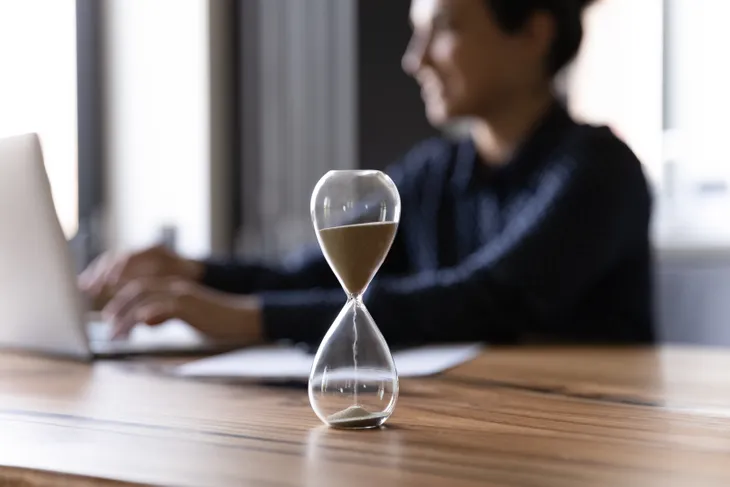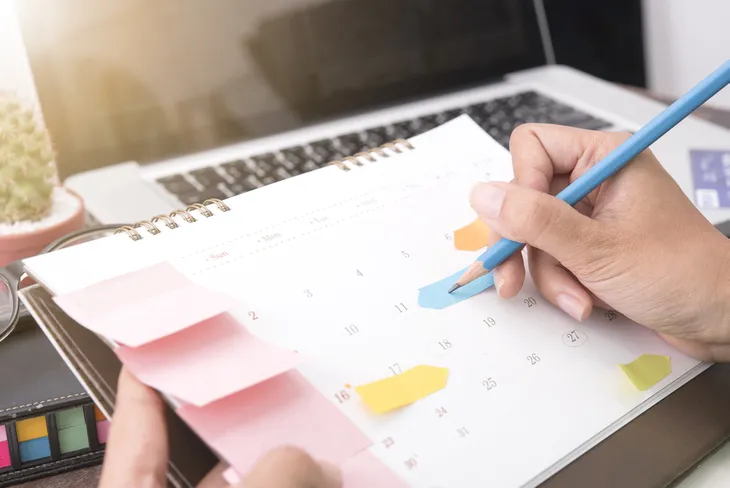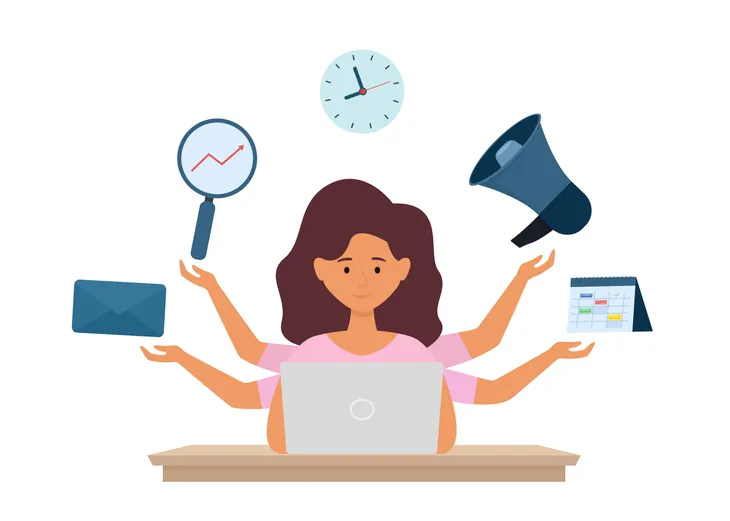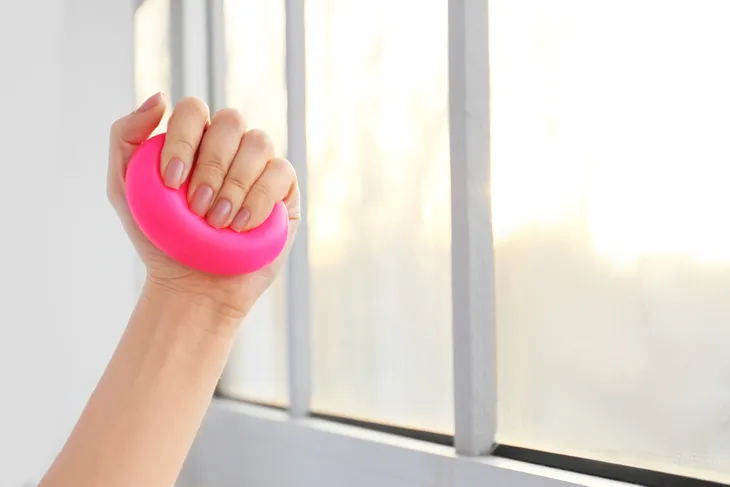- ADHD can affect your personal and professional life.
- It’s common to struggle with procrastination, deadlines, impulsive behaviors, and staying organized.
- Luckily, simple yet effective self-help strategies, as well as medication, can help you cope and thrive!
Attention deficit hyperactivity disorder (ADHD) can be a lifelong disability and some people aren’t diagnosed until adulthood. It can also be debilitating, affecting your day-to-day tasks. Adults with ADHD often struggle with procrastination, meeting deadlines, impulsive behavior, and staying organized, which can affect their personal and professional life. Luckily there are treatments and coping strategies that can help.
While medication can certainly help adults manage ADHD, the Help Guide points out that it’s not a cure or the only solution. There are self-help strategies you can follow in conjunction with your medication to help you manage the symptoms of ADHD. If you have ADHD or know someone with it, here are 12 coping strategies that may help.
Time Management Tips for Adults With ADHD
Learning to manage your time can be difficult for everyone but it can be especially difficult for adults with ADHD. The Help Guide says, adults with ADHD “often have a different perception of how time passes.” The source suggests one way you can help manage your time is by wearing a watch. When focusing on a task, make note of the time so you can keep track of how much time has passed.
Another helpful tip is to use timers to allot yourself designated time for tasks. The source says that longer tasks may require alarms with regular intervals to keep you productive and to help you know how much time has passed. It’s also a good idea to allot more time than you think necessary for each task.
The Benefits of Making Lists and Using a Planner
Managing time is just one thing adults with ADHD struggle with. Managing tasks is another. Medical News Today says a simple yet effective way to manage your tasks is to make lists. Write out everything you need to accomplish and then prioritize your tasks in order or urgency.
Adults with ADHD may also greatly benefit from using a planner. Digital or pen-and-paper planners can help you keep a record of all dates and times of important commitments like medical appointments, meetings, and dates with loved ones.
How to Manage Impulsiveness With ADHD
Controlling impulses can also be a challenge for adults with ADHD. This can make completing tasks and meeting deadlines very difficult. The Help Guide says one way to manage impulsiveness is to avoid multitasking and focus on one task at a time, starting with the most important task.
To help you stay focused, it’s best to break large jobs into smaller, more manageable tasks. Working in shorter increments can help you stay focused to complete the task. You may also benefit from setting a timer to help you stay on schedule and prevent impulsive behaviors when you’re trying to focus.
Other impulsive behaviors like impulse buying can also be managed by taking time to ponder the purchase. Ask yourself questions like: Do I really need this? Do I absolutely love it? Do I have a place for this? If you answer no to any of these, it’s likely an impulse buy and you don’t actually need it.
Tips for Staying Organized With ADHD
Organization can be a big struggle for adults with ADHD. After all, the Help Guide points out that inattention and distractibility are two of the most common traits of ADHD. This can make organizing overwhelming. But being organized at home and at work can help reduce anxiety and increase productivity, says Medical News Today.
Tackle one room at a time and start by decluttering. Get rid of things you don’t need and put away the things you want to keep in storage bins. It’s also a good idea to create designated areas for things you use often like your keys, wallet, bills, and other items that are easily misplaced.
In the future, you can prevent clutter from building by dealing with things immediately. Keeping up with these habits can help your space stay organized.
Tips to Reduce Distractions With ADHD
Adults with ADHD are easily distracted so it’s important to do your best to remove distractions to help you stay focused. Harvard Health says in the workplace you may need to rearrange your workstation. For example, you may need to move your desk so it doesn’t face a window or move to a quieter space. Even simple things like silencing your phone and email alerts can help prevent distractions too.
The source also says that if you’re distracted by a thought that isn’t relevant to the task at hand, then write it down. This way you can come back to the thought later when you’ve finished your current task.
 Shutterstock/fizkes
Shutterstock/fizkesThe Importance of Managing Stress
Chronic stress isn’t good for anyone and unfortunately, adults with ADHD are prone to it. The combination of impulsiveness and disorganization can lead to extra stress and poor mood. Luckily there are simple ways you can manage it and it all starts with creating healthy routines and habits.
Medical News Today suggests making sleep a priority. You can do this by avoiding caffeine late in the day, and maintaining a regular sleep-wake schedule. Engaging in regular physical activity can also help decrease stress. Make it a priority to move your body daily whether that’s going for a walk, doing an at-home workout, or going to the gym.
What you eat can also affect your stress and mood. The source says a poor diet may make ADHD symptoms worse so it’s important to prioritize healthy sources of protein, whole grains, and plenty of fruits and vegetables. Do your best to limit sugar and fast food.
Finally, practicing mindfulness may also help reduce stress and manage your symptoms. This involves focusing your awareness on the present moment which in turn, may help you stay focused and reduce impulsive behaviors. There are many apps and online videos that can help you get started.
Tips to Thrive at Work
Adults with ADHD can have successful careers in many different fields but there are often challenges. For example, it’s common to struggle with sitting still, completing tasks, and staying organized but the Help Guide says there are a few simple things you can do to help you thrive in the workplace.
For starters, keep an organized environment to help prevent distractions. Set aside a few minutes every day to tidy up your area. If you work at a desk, avoid keeping too many things on the desk to avoid distraction. The source says it can also be helpful to make a list of tasks you need to complete in the day and write them down in order of priority. As you complete each task, cross it off. This visualization can be helpful and rewarding. Meeting deadlines at work can also be a challenge. Let’s take a look at what you can do to successfully meet deadlines next.
Tips to Meet Deadlines With ADHD
According to Harvard Health, meeting deadlines when you have adult ADHD can be a challenge in two major ways. For starters, adults with ADHD often have difficulty starting projects because they may feel intimidated so they put it off. It’s also a challenge because once the project starts, it’s easy to become distracted, resulting in an unfinished project. Luckily the source provides a few helpful tips to avoid these challenges, including:
- Deal with other smaller tasks, such as emails, as soon as possible to avoid feeling overwhelmed when you start your project.
- Keep your eye on the time so you can avoid spending too much time on one task.
- Multitasking sounds good in theory but it is very difficult for adults with ADHD so instead, tackle one task at a time.
- Sometimes you need to say no to new projects in order to meet your current deadlines.
- Avoid procrastination by putting it on your to-do list. The source says this may help trick you into starting your work.
How to Improve Your Attention Span With ADHD
Inattention is a telltale trait of ADHD but there are ways you can improve it. It is possible to stay focused but you’ll have to work at it, especially if you’re trying to focus on something that you don’t find interesting. The Help Guide says following directions can also be a challenge but you can help improve this by echoing directions. Meaning, when someone gives you instructions, say them out loud to ensure you heard them correctly.
The source also suggests asking for “an advance copy of the relevant materials—such as a meeting agenda or lecture outline,” ahead of meetings or workshops. Use the notes as a guide while you listen and take notes. Writing notes can help you stay focused too.
Finally, move around when you can. This will help you stay focused. Staying still for too long may increase restlessness and fidgeting. The source says during appropriate times, take a quick walk, jump around, or try squeezing a stress ball to help you stay focused later.
Tips to Deal With Paperwork
Paperwork can be a daunting task for anyone but it can especially be a challenge for adults with ADHD, especially because disorganization is a common trait. The best way to deal with paperwork is right away to prevent it from building up and this applies at home and in the workplace. Set aside a few minutes every day to deal with your mail at home and important papers at work.
The Help Guide also says going paperless may help too. You can request electronic statements instead of paper copies for some things. Creating a color-coded filing system can also help your papers (and mind!) stay organized.
How to Manage Finances With ADHD
Managing finances can also be a challenge because it requires budgeting, organization, and attention to detail, all of which can be challenging for adults with ADHD. Medical News Today says one way you manage your finances is by setting up reminders in your calendar to pay bills. This will help ensure you don’t miss their due dates.
Online banking is also a great option as it prevents paper clutter. It’s also easy to use and some banks even have budgeting tools built into their apps. You can set time in your calendar to go over your budget every month to ensure you’re staying on track with your finances.
Ask For Help
Living with ADHD can be a challenge and sometimes you need to reach out for help. Though asking for help can be scary, it is necessary and there are people who can support you. Talk to your doctor if you’re struggling. They may recommend medication or other treatment options like behavioral therapy. Therapy can help you develop new positive behaviors, which help you manage your symptoms. Support groups can also help you feel less alone.
Psych Central also suggests “identify someone in your life to help keep you accountable to your goals.” This person can check in and help remind you of important tasks. The bottom line is, never be ashamed to ask for help.














